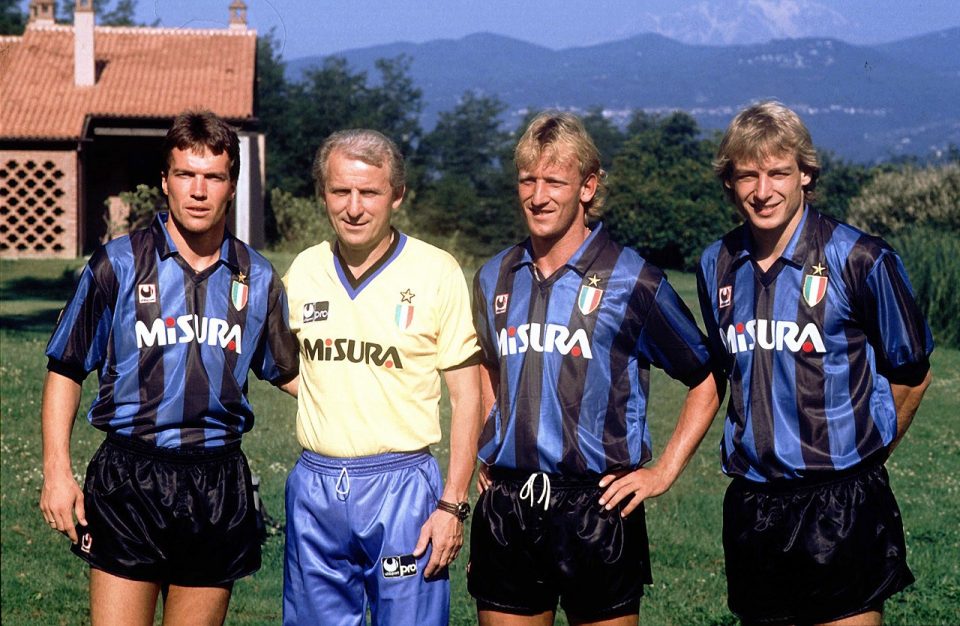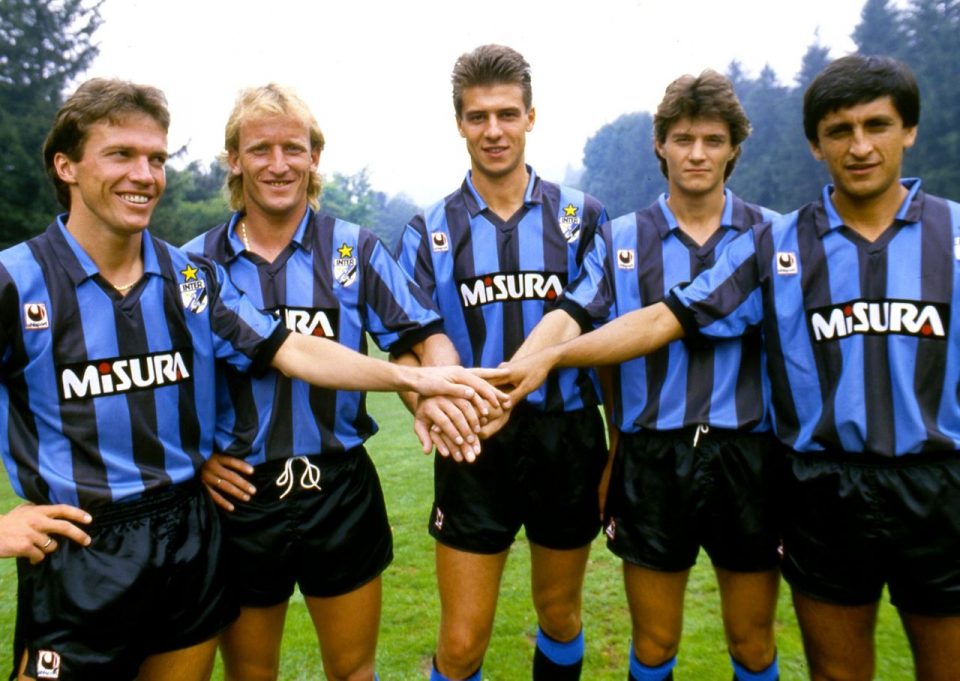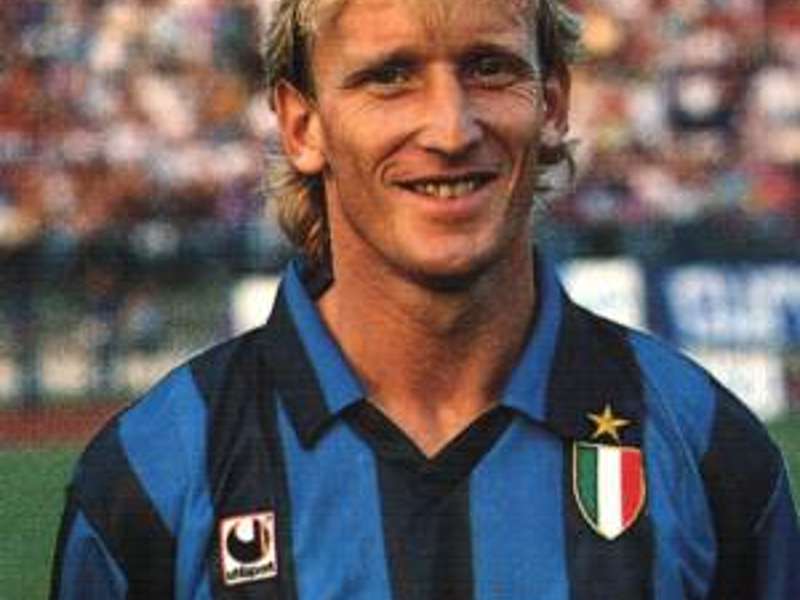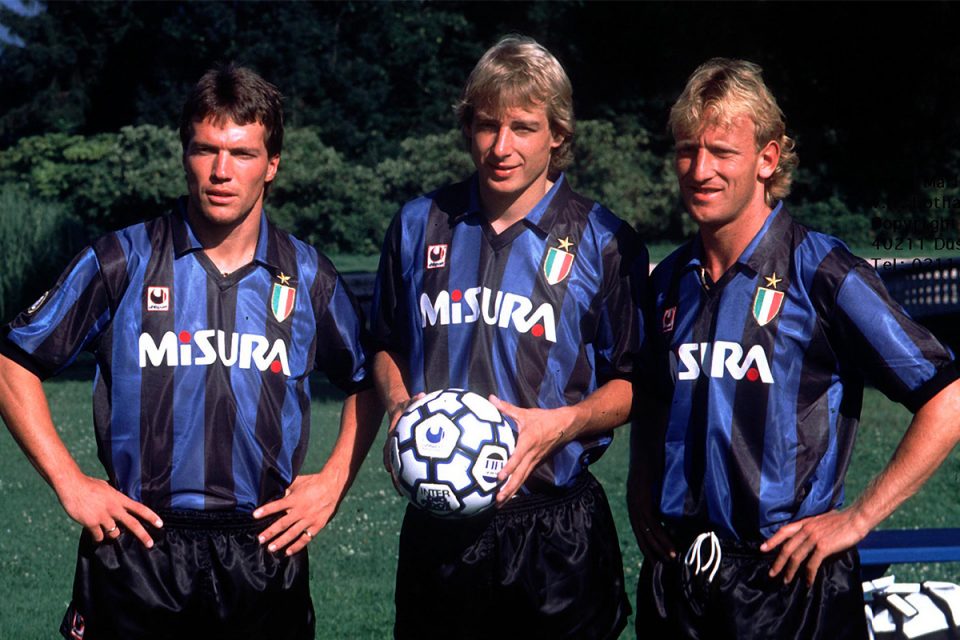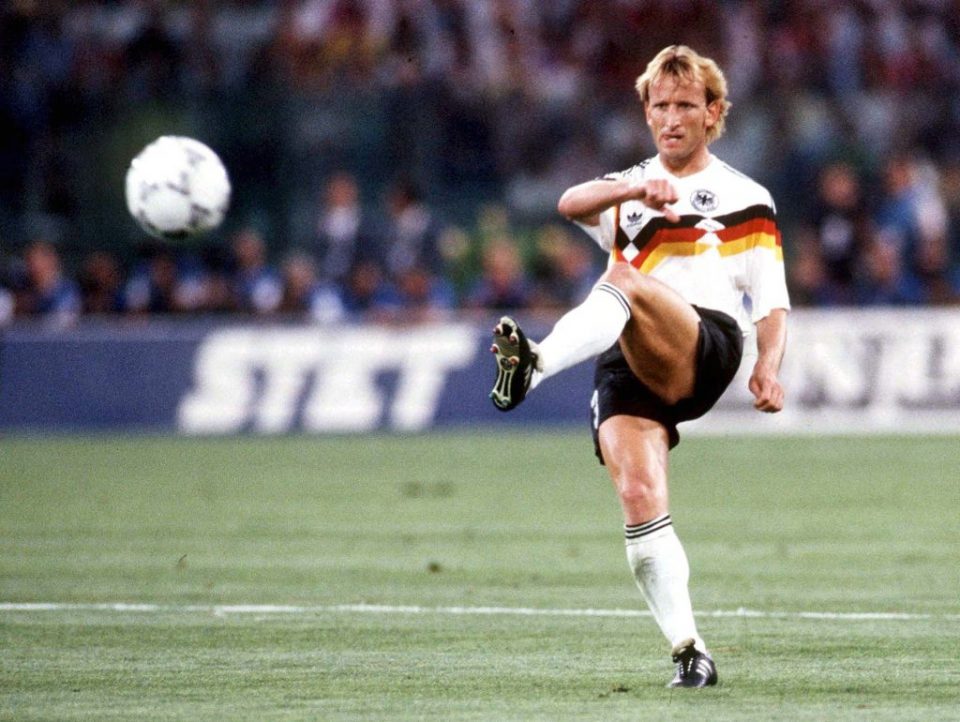There has perhaps never been a more versatile player to feature for Inter than Andreas Brehme. The player who calmly scored the goal that propelled Germany to their third World Cup triumph in 1990, was also a pivotal member of Giovanni Trapattoni’s Inter. This is the story of the second member of Inter’s world champion German trio. Andreas Brehme, perhaps not the most common household name such as Matthäus or Klinsmann, was every bit as important.
After successful stints at 1. FC Kaiserslautern and Bayern München, Andres Brehme joined Inter in the summer of 1988 alongside Bayern and Germany teammate Lothar Matthäus. Much like Matthäus, Inter is the club where Brehme would spend the most productive years of his legendary career.
For many years Inter had muddled in Serie A mediocrity. Between the seasons of 1980-81 and 1987-88 Inter’s average final placing in the league table was fourth. The club had appointed former Juventus manager Giovanni Trapattoni to right the ship and restore Inter to glory. Trapattoni’s first action item was to find and sign the right players.
Unlike other Serie A clubs of the time, Inter played a far more attack-oriented brand of football. This meant that every player in the squad had to be skilled when moving the ball forward. Andreas Brehme was no exception. In fact, he may have been the most diverse player on the Inter roster under Trapattoni.
What set Brehme apart from other players was his uncanny ability to use both feet exceptionally well. To this day, German legend Franz Beckenbauer still does not know which foot served Brehme best. His control of the ball and shot were both equally lethal from either side. Brehme was an attacking full-back, which made him invaluable in Trapattoni’s system.
Brehme was capable of playing on either side of the pitch. He is widely considered the best full-back of his generation, though he was certainly not limited to this role. He could transition into an offensive-minded winger in the blink of an eye. On rare occasions Brehme would even line up in the middle of the pitch as a defensive midfielder.
Andreas Brehme was the textbook definition of a “utility player.” He was perhaps the most versatile footballer on the planet during the prime of his career. In addition to his incredible ambidexterity, Brehme was gifted with great technical ability, stamina, and tactical intelligence.
Additionally, he had a knack for anticipating the movements of his opponents as well as those of his teammates. This enabled him to be in perfect position to intercept an opposing player’s pass when defending, whilst also allowing him to make perfectly-timed runs in attack. Trapattoni had a gem of a player in Andreas Brehme.
With the addition of Brehme and Matthäus, Trapattoni had successfully resurrected Inter. The San Siro was their new home and they fully embraced it.
I was at Inter for four years, but the club forever has a place in my heart. Inter hadn’t won the title for ten years, but we had a fantastic season with an exceptional team. There were Italy players like Nicola Berti and Alessandro Bianchi, plus me and Lothar Matthaus. — Andreas Brehme
For so many players in today’s game, playing for a club is mostly about money and fame. In a time before transfer fees and wages were completely out of hand it was primarily about compatibility, comfort, and the sheer desire to play for a certain club.
When such harmony exists among players who are simultaneously gifted footballers, the only possible outcome is success. This success for Trapattoni’s Inter did not take long. Brehme’s inaugural season with the Nerazzurri resulted in the club winning it’s first Scudetto in nearly a decade.
The key to Inter’s success was mixing “German efficiency” with the talent which already resided within the side. As Milan had done only a few years prior with their “Dutch invasion,” Trapattoni had to think outside of the box in order for his side to compete with their cross-city rivals, as well as Juventus and Napoli, for Italian supremacy.
Brehme was a key component in Inter’s back line which also included Giuseppe Baresi and Giuseppe Bergomi. Trapattoni’s back four conceded a mere 19 goals during their Scudetto-winning 1988-89 Serie A campaign.
Far from simply being a defender, Brehme would make the transition from left-back to left-mid with the greatest of ease. It was this “well-roundness” which made this player so incredibly special, as Brehme himself will attest to.
I worked hard on both my feet. This is an important lesson for young players. It’s vital to be well-rounded. When I joined in 1988, we won the Scudetto that season. — Andreas Brehme
Beyond being a defensive force who frustrated opponents unmercifully with his intelligence, instinct, and timing, Brehme could also provide great support in the build-up play and attack. During the 1988-89 season Brehme scored three goals for the Nerazzurri, doubling that total the following campaign.
The sexiest positions in football typically revolve around the attack. It is sometimes easy to forget or take for granted, the contributions of “do-it-all” players such as Andreas Brehme when they play alongside offensive-minded players in the form of Lothar Matthäus, Jürgen Klinsmann, Aldo Serena, and Ramón Diaz.
As a result of his brilliant efforts for Inter in Serie A and the German National Team at the World Cup, Brehme finished third in the Ballon d’Or voting in 1990, behind club and country teammate Lothar Matthäus and Juve’s Salvatore Schillaci.
After winning the 1990 World Cup, the only thing missing from Brehme’s resumé was European silverware. With one last goal to accomplish together, the dynamic German duo of Andreas Brehme and Lothar Matthäus would embark on a long, but rewarding journey, to deliver a European trophy to Inter for the first since 1965.
On May 22nd, 1991, Inter’s long continental drought came to and end as Trapattoni’s side defeated Ottavio Bianchi’s AS Roma 2-1 on aggregate to claim the UEFA Cup. This was the final jewel in the crown of Andrea Brehme as a player.
Almost unparalleled were Brehme’s successes over a three year span from 1988 to 1991. He won both domestic and European titles with Inter, while becoming a world champion with Germany in between those.
Additionally, it was Brehme who was chosen to take the penalty shot against Diego Maradona’s Argentina with the World Cup on the line. As cool and calm as one could be, able to strike the ball with either foot, Brehme placed the ball neatly into the bottom-left corner to give Germany their “third star.”
After the 1991-92 season, a year after Giovanni Trapattoni departed Inter, so too did the German trio of Brehme, Matthäus, and Klinsmann. Each of them would go their separate ways, and all would enjoy further domestic success at their future clubs.
Despite how it ended (Inter finishing 8th during the 91-92 campaign) no one will ever forget the contributions of Andreas Brehme in making Inter a global football power once more. In all, Brehme made over 150 appearances in the shirt of the Nerazzurri and was a key figure in the most successful era at Inter since Helenio Herrera’s “Grande Inter” of the 1960s.
This week we salute one of the greatest full-backs, midfielders, center-mids…heck, wherever you want to place him, he was great! Indeed, we salute one of the true icons of Inter, Calcio, and football as a whole, the versatile German, Andreas Brehme.
Grazie Andreas and Forza Inter!

